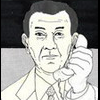Why wouldn't you just take an aromatise inhibitor with finasteride to keep E2 in check? That's why I was taking zinc. Plus I take 1-2mg of deprenyl a day, and 100-200mg of vitamin B6, both to keep prolactin check.
You should get regular blood tests to check your hormonal levels on finasteride.
Still, it's trickier when DHT is being blocked, plus DHT has it's own local effects on vasodilation and general nerve function.
So really I'm stuffed if I don't get off fin?
I might have to try some topical ant-androgens. I was thinking a combo of RU and Spiro.
I've read reports of guys not having a single side effect while on Fin but as soon as they come off and the drug leaves their system their entire endocrine system crashes. Well actually, let me be clear. Fin use>cessation>spike in hormones as drug leaves system(accompanied by heightened sexual functioning)>entire endocrine system crash with little to no response from hormone treatment therapies afterwards(testosterone, dht, estradial management). For some reasons some guy's are just all set up to get broken from Fin. This is all anecdotal of course. I'm not saying this is the exact procedure by which PFS occurs but it seems to be commonly described scenario by ex-fin users.
Oh I know, I've seen the reports and alleged testimonials as well - it's hard to understand exactly what happens, but the cessation MUST be followed by a higher E2 increase, it could be that as DHT production reboots somewhat, that the following binding of SHBG (by returning DHT) combined with transient, creeping estradiol elevations, beats the E2 reduction (that would normally happen from DHT) circuitry to the race, or the initial E2 reboot caused by DHT's complex hypothalamic interactions, sends it right through the roof! In essence, what this means is the ratios of hormones are all fucked up - and this leads to the increased sensitivity to side-effects that otherwise wouldn't normally have been there.
It could also be that testosterone skyrockets upon discontinuation, but that's just initially, then the body sense these ridiculous high levels and changes, and starts pumping out even MORE E2 to counter it - resulting in total and complete estrogen dominance, combined with a surge of DHT - this would also inhibit and with the High E2 surge on top of that - a complete shutdown of the HPTA.
I'm just theorizing though, but this seems like the most feasible argument, don't you think?
Keep in mind DHT also interacts with and preferably decreases glutamate levels - so it could be that DHT and it's other interactions with NT systems which happen to be very active in the HPTA anyway, end up creating a feedback loop that most of aren't aware of.
For example
-Start finasteride now.
-3 months in E2 is steadily increasing...this follows with E2 induced changes like NMDA-hyperactivity and histamine release, as well as changes induced by estrogen in serotonin receptors. This is unfavorable and inhibits the HPTA itself after a while.
-now discontinuation results in a surge of testosterone, DHT, or both...meanwhile, E2 is still elevated.
-now we have neuroendocrine changes, inhibition of the HPTA, and surges of glutamate going down and then all the way up, but mostly, all of this extra glutamate and serotonin from the E2 causes severe prolactin release as well as cortisol..
ALSO, keep in mind DHT inhibits cortisol production and responses, as well as decreasing glutamate.
So again, here is where we are at = E2 Dominance, Prolactin Excess and Cortisol Dominance = complete (or near complete) shutdown of HPTA.























































